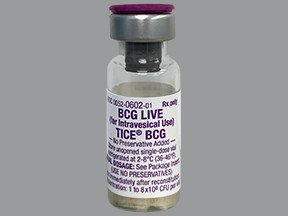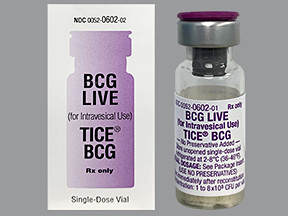BCG - INTRAVESICAL
PHONETIC PRONUNCIATION:
COMMON BRAND NAME(S): Theracys
GENERIC NAME(S): BCG live
Uses
USES: This medication is used to treat a certain type of bladder cancer (carcinoma in situ-CIS) and prevent it from returning. It is also used to prevent another type of bladder cancer (papillary tumor) from returning after surgery to remove it. This medication works by causing the body's defense system (immune system) to become more active. This form of the medication is not used to prevent tuberculosis.
How to use BCG - INTRAVESICAL
HOW TO USE: This medication is given into the bladder through a tube (catheter) by a health care professional as directed by your doctor. This medication is usually given weekly for the first 6 weeks and then less often thereafter as directed by your doctor. Do not drink any fluids for 4 hours before treatment. The medication is left in the bladder for up to 2 hours and then released by urinating. Follow your doctor's instructions carefully. There may be some burning pain when you first urinate. Since the urine contains live bacteria that may infect you or others, you must sit down to urinate for 6 hours after treatment to avoid splashing of the urine. After each time you urinate during this 6-hour period, pour household bleach (about the same amount of bleach as the amount of urine) into the toilet, then wait 15 minutes before flushing. Always wash your hands afterward. Talk to your doctor about other important things you must do to prevent infection. Drink plenty of fluids after your first urination unless otherwise directed by your doctor. Doing so helps clear the medication from your body.
Side Effects
Precautions
Interactions
Overdose
Images
Reviews
Faq for BCG - INTRAVESICAL
BCG intravesical therapy is a type of treatment for non-muscle invasive bladder cancer. It involves the use of Bacillus Calmette-Guérin (BCG), which is a weakened form of tuberculosis bacteria, to stimulate the immune system and destroy cancer cells in the bladder.
BCG intravesical therapy is administered by inserting a catheter into the bladder and instilling a liquid solution containing the BCG bacteria. The patient is required to hold the solution in the bladder for a certain period of time before it is emptied.
Common side effects of BCG intravesical therapy include urinary frequency, urgency, and pain during urination. Some patients may also experience flu-like symptoms such as fever, chills, and muscle aches. In rare cases, BCG can cause more serious side effects such as bladder infections or inflammation.
The treatment duration for BCG intravesical therapy typically consists of an initial course of 6 weekly treatments, followed by maintenance treatments at regular intervals, usually for up to 3 years. The exact duration and schedule may vary depending on the individual's response to the therapy and the stage of their bladder cancer.
BCG intravesical therapy has been shown to be effective in reducing the risk of bladder cancer recurrence and progression in patients with non-muscle invasive bladder cancer. Studies have demonstrated that it can significantly decrease the likelihood of cancer returning after surgery and improve overall survival rates.
BCG intravesical therapy is generally not recommended for individuals with a compromised immune system, active infections, or a history of severe allergic reactions to BCG. It is important to inform your healthcare provider about any medical conditions or medications you are currently taking before starting the treatment.
BCG intravesical therapy can be used in combination with other treatments for bladder cancer, such as transurethral resection of bladder tumor (TURBT) or chemotherapy. Your healthcare provider will determine the most appropriate treatment plan based on the stage and characteristics of your bladder cancer.
If you experience severe or persistent side effects during BCG intravesical therapy, it is important to contact your healthcare provider. They can provide guidance on managing the side effects or adjust the treatment plan if necessary.
Warning
WARNING: This medication contains live bacteria that have been weakened to decrease the chances of causing an illness. However, this medication has rarely caused very serious, possibly fatal infections. Tell your doctor right away if you develop any signs of infection (e.g., high/persistent fever).
Disclaimer
IMPORTANT: HOW TO USE THIS INFORMATION: This is a summary and does NOT have all possible information about this product. This information does not assure that this product is safe, effective, or appropriate for you. This information is not individual medical advice and does not substitute for the advice of your health care professional. Always ask your health care professional for complete information about this product and your specific health needs.


No Reviews Yet